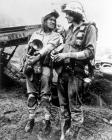You know, the girl I love, oh man, she road that Freedom Train
You know, the girl I love, oh man, she road that Freedom Train
You know, she boarded in Chicago, she was going to Colorado Springs
Well now, you know, good will was her desire, man, well now, freedom was her aim
Good will was her desire, man, well you know, freedom was her aim
Well that's the reason my baby left me, oh man, just to ride that Freedom Train
You know, I was standing at the station, oh man, tears come rolling down
Yes, I was standing at the station, oh man, tears come rolling down
Well, now you know, I hate to see, man, oh Lord, my baby leave this town
You know, the girl I love, oh man, she road that Freedom Train
You know, she boarded in Chicago, she was going to Colorado Springs
Well now, you know, good will was her desire, man, well now, freedom was her aim
Good will was her desire, man, well you know, freedom was her aim
Well that's the reason my baby left me, oh man, just to ride that Freedom Train
You know, I was standing at the station, oh man, tears come rolling down
Yes, I was standing at the station, oh man, tears come rolling down
Well, now you know, I hate to see, man, oh Lord, my baby leave this town
inviata da Pluck - 12/2/2025 - 18:48
×
![]()






Second, many black listeners must have heard the song as directing racial protest at the city of Chicago. And that's because the song's protagonist is lamenting losing his woman, who is leaving Chicago to find freedom in the west. Chicago, Detroit, and other northern cities weren't exactly beacons of freedom in 1948, which is the year this song was recorded. Conditions in the north were better than in the south, but that didn't change the fact that racial prejudice, discrimination, and segregation existed in the north, also. Even the Ku Klux Klan existed in the northern cities.
I believe that protest against racism in Chicago was a key part of another song which was recorded in 1948: Muddy Waters's first hit, "I Can't Be Satisfied." It may have even been the main thing that made it such a big hit in Chicago.
Jim Hauser, Dec 14, 2024
Social (racial) protest in the blues | Steve Hoffman Music Forums - p.4